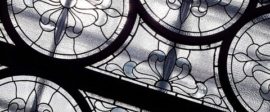No One Does Good? Really?
Daily Reflection / Produced by The High Calling
But no, all have turned away; all have become corrupt. No one does good, not a single one!
Psalm 14:3
I remember when I first resolved to read through the whole Bible. I was in high school, and it seemed like the godly thing to do. But as I began making my way through Scripture, I kept stumbling upon verses that were unsettling to me. Sometimes what a verse described seemed abhorrent to me. Other verses just seemed wrong. Now I believed that the Bible was God's Word and was always true. But what was I to do with verses that seemed to be, well, false?
Psalm 14:3 was such a verse. I encountered this verse as it was quoted in Romans 3:12, where it says, "All have turned away; all have become useless. No one does good, not a single one." As I read this, I thought to myself: "Wait! How is this possible? Somebody does good. I have seen people be generous to the poor. I have watched people love difficult people. And I have even done some good things in my life. So how can the Bible say that no one does good, not a single one?"
Some people, when they come to verses like Psalm 14:3, quickly conclude that the Bible gets it wrong. But, whether they believe in biblical authority or not, they are not reading Scripture with the kind of attentiveness that literature deserves. All responsible reading pays attention to the genre of the material and its context. So, when we approach the Psalms, we must remember that they are poetry. Psalm 14:3 isn't a piece of prosaic legal material. Rather, it is a poetic, indeed, hyperbolic expression of the pervasive sinfulness of humanity. Poetry says, "No one does good, not a single one." Philosophical discourse might say, "All people do wrong, but some people do what's right some of the time."
Psalm 14:3 appears in a poem that laments the sinfulness of all human beings. In the end, the good that we do cannot erase our sinful behavior. Thus, Psalm 14 ends by asking a paramount question: "Who will come from Mount Zion to rescue us?" (14:7). Who is able to save us? Only the Lord (14:7). He alone is able to restore his people, and ultimately the whole world.
In Romans 3, Paul quotes Psalm 14:3 in order to set up the need for a savior. Yes, no one does good. Both Jews and Gentiles fall short of God's righteousness: "For everyone has sinned; we all fall short of God's glorious standard" (Rom. 3:23). This is the bad news that prepares the way for the good news: "Yet God, with undeserved kindness, declares that we are righteous. He did this through Christ Jesus when he freed us from the penalty for our sins" (Rom. 3:24). Truly, everyone does what is wrong. No one does good and good alone . . . except for Jesus Christ, our Savior, through whose goodness we are righteous in God's sight.
QUESTIONS FOR FURTHER REFLECTION: When you read a verse like Psalm 14:3, a verse that somehow seems wrong to you, what do you do? Do you ever believe that you can be good enough to earn God's favor? How does the reality of your sinfulness impact your relationship with God?
PRAYER: O Lord, as you know, there are many passages of Scripture that are disconcerting to us, things we don't understand, or things we understand but don't like. At times your Word is crystal clear and compelling. But then there are other times . . .
Help us, Lord, to understand your Word correctly. By your Spirit, may we pay close attention to the text and its context. Help us to be accurate readers.
And when we come upon things that we don't like, help us not to reject your Word as something less than true. Rather, teach us to dig deeply, to think, to pray, to converse with others, to wrestle with Scripture so that we might be changed by it.
Finally, gracious God, thank you for your salvation, for reaching out to us even when we were sinners. Thank you for your grace poured out through Jesus Christ. Amen.












